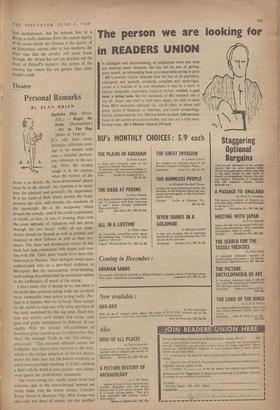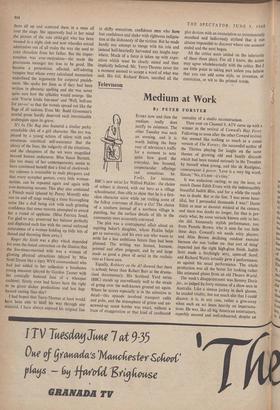Th eatre
Personal Remarks
By ALAN BRIEN
Bachelor Flat. (Picca- dilly.) - Roger the Sixth. (Westminster.) -It's In The Bag. (Duke of York's.) IT's odd how many dramatic criticisms man- age to be written with only a minimal perfunc- tory reference to the act- ing. What the camera image is in the cinema, what the texture of the prose is in fiction, the three-dimensional player must be in the theatre-- his function is to incar- nate the abstract and personify the impersonal. It is his mask of flesh which moulds the brain, protects the eyes, and muscles the emotions of the playwright. He . is the manpower which propels the vehicle--and if the coolie is paralysed, or drunk, or lazy, or out of training, then even the most splendid of rickshaws will not move through the two hours' traffic of our stage. Actors should be blamed as well as praised, and analysed in their failures as well as their suc- cesses. The three sad mechanical farces of last week had little connection with drama and even less with life. Their plots would have been old- fashioned to Plautus. Their dialogue would seem sophisticated only to a pier-head audience at Blackpool. But my excruciating. mind-bruising, teeth-aching discomfort had its immediate source in the inefficiency of much of the acting.
I don't know why it should be so, but there is no doubt that actresses acting badly are so much more unbearable than actors acting badly. Per- haps it is because they try so hard. Their assault on the nerves is total war with every province of the body mobilised for the big push. Each eye- lash and tendril, each dimple and cavity, each gum and girdle semaphores its defiance of our apathy. With the suicidal self-confidence of kamikaze pilots ramming an aircraft-carrier, they blaze the message 'Look at me, I'm acting-- atrociously.' That personal embrace across the footlights, that skin-to-skin intimacy in the dark, which is the unique seduction of the live theatre makes the false face and the hollow emphasis so much more gratingly insulting. It is like catching a thief with his hand in your pocket-you cannot even ignore his professional clumsiness.
The worst acting, too, rarely comes from bad actresses, just as the worst-dressed women are rarely those with the fewest clothes. Consider Evans Evans in Bachelor Flat. Miss Evans was obviously not short of talents, but she jumbled them all up and scattered them in a mess all over the stage. She apparently had in her mind the picture of the cute child-girl who has been weaned in a night club and now wheedles sexual admiration out of all males the way she used to coax chocolate from her father. But the imper- sonation was over-meticulous— she made the precocious teenager too true to be good. She became a pretentious, affected, self-adoring vampire brat whose every calculated mannerism underlined the arguments for corporal punish- ment. She spoke her lines as if they had been written in phonetic spelling and she was never quite sure how the syllables would emerge. She said 'You're kinda fun-neee' and 'Well, bull-cce for yer-oo' so that the vowels spread out like the flags of all nations. Even Mr. Budd Grossman's mortal prose hardly deserved such interminable arabesques upon its grave.
It's In The Bag also featured a similar perky smackable chit of a girl character. She too was played by a young actress of talent with such enormous uncritical self-assurance that the idiocy of the lines, the vulgarity of the situations, and the cheapness of the wit were magnified beyond human endurance. Miss Susan Burnett, like too many of her contemporaries, seems to have convinced herself that a kind of clockwork- have convinced herself that a kind of clockwork- toy cuteness is irresistible to male playgoers and that every nymphet gesture, every little woman- nerism, can be repeated again and again with ever-increasing success. This play also contained a French maid (played by Penny Morrell) who ran on and off stage making a tinny hiccoughing noise like a doll being sick with such grinning confidence that some morons attempted to award her a round of applause. (Miss Patricia Jesse!, I'm glad to say, preserved her balance perfectly and displayed each line with the casual unforced naturalness of a woman holding up little bits of thread and throwing them away.) Roger the Sixth was a play which depended for even the tiniest conviction on the illusion that the five-times-married wife was a woman of glowing physical attractions (played by Miss Noel Dyson like a tipsy WVS commandant) who had just added to her collection a handsome young innocent (played by Gordon Tanner with the comically battered face of a whoopee cushion). Surely even bad farces have the right to be given slicker productions and less hap- hazard casting than this?
I had hoped that Terry-Thomas at least would have been able to bluff his way through any material. l have always enjoyed his original line in shifty executives, confidence men who have lost confidence and shake with righteous indigna- tion at the dishonesty of the victims. But he made hardly any attempt to merge with his role and instead half-heartedly harvested any laughs any- where. Much of a farce is taken up with expo- sition which must be clearly stated and then implicitly believed. Mr. Terry-Thomas never for a moment seemed to accept a word of what was said. His foil, Richard Briers, unrolled all the plot devices with an enunciation so monotonously mouthed and ludicrously stylised that it was almost impossible to discover where one sentence ended and the next began.
All the critics seem united on the inferiority of these three plays. For all I know, the actors may agree wholeheartedly with the critics. But I see little point in taking part unless you believe that you can add some style, or invention, or conviction, or wit to the printed words.



































 Previous page
Previous page